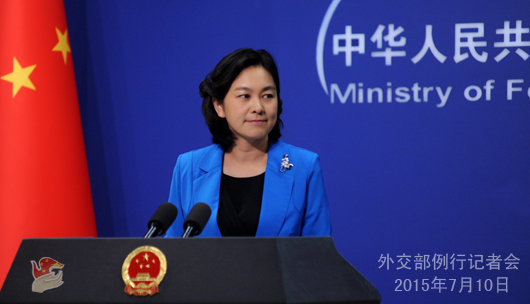On 22 July 2015, Japan released a document on its Foreign Ministry’s website on China’s oil and gas development in the East China Sea, and demanded that China halt its oil and gas development activities in the waters west to Japan’s unilaterally-claimed median line in the East China Sea. There are no grounds whatsoever for Japan’s demand, and China’s oil and gas development in the East China Sea is fully justified and legitimate.
Foreign Ministry Spokesperson Lu Kang
1. Being carried out in the undisputed waters under China’s jurisdiction, China’s oil and gas development in the East China Sea falls within China’s sovereign rights and jurisdiction, and is beyond reproach. China has conducted such activities in the same waters of the East China Sea since the 1970s, and for a long time, Japan never raised any objection to it. It was until 2004 that Japan started to change its usual practice and made repeated accusations and negative publicity against China’s normal oil and gas development.
2. China and Japan have yet to reach agreement on maritime delimitation in the East China Sea. China does not recognize the so-called median line unilaterally claimed by Japan, nor Japan’s position of delimitating the East China Sea on the basis of the so-called median line. China claims a 200-nautical-mile exclusive economic zone and China’s continental shelf in the East China Sea prolongs naturally to the Okinawa Trough. At the same time, China is ready to work with Japan to resolve the issue of maritime delimitation in the East China Sea by reaching an agreement in line with the principle of equity on the basis of international law, including the United Nations Convention on the Law of the Sea (UNCLOS).
3. Acting in the overall interests of bilateral ties with Japan, China has long exercised restraint and refrained from conducting oil and gas exploitation in the disputed areas of the East China Sea. We have proposed joint development with Japan without prejudice to the respective legal positions of the two countries.
4. For years China and Japan maintained communication over issues related to the East China Sea,and the two sides reached principled consensus on the East China Sea issue in June 2008. Yet Japan’s misinterpretation of the consensus thereafter created obstacles to its implementation. The two governments held the first round of consultation on the implementation of the consensus in July 2010, but the process came to a halt because of the incidents caused by Japan in the East China Sea. We hope Japan will come back to the consensus as early as possible, uphold it and create favorable environment and conditions to restart the consultation on implementing the consensus.
5. China is ready to have dialogue and communication with Japan on issues related to the East China Sea through various channels, including the High-level Consultation Mechanism on Maritime Affairs, on the basis of respecting historical facts and international law, to enhance mutual trust, manage differences and promote cooperation. This serves not only peace and stability in the East China Sea, but also the common interests of the two countries and peoples.


